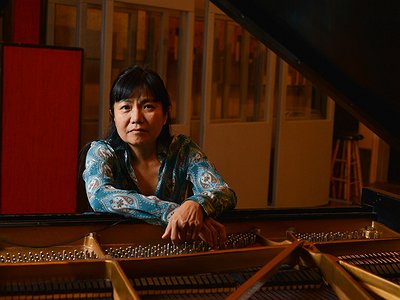Name: Satoko Fujii
Nationality: Japanese
Occupation: Pianist, composer, improviser
Current release: Satoko Fujii's Hyaku: One Hundred Dreams is out now. It features Wadada Leo Smith, Natsuki Tamura, Ingrid Laubrock, Sara Schoenbeck, Ikue Mori, Brandon Lopez, Tom Rainey, and Chris Corsano.
[Read our Wadada Leo Smith interview]
If you enjoyed this interview with Satoko Fujii and would like to stay up to date, visit her official website. You can also find her on Facebook, bandcamp, and Soundcloud.
We also recommend our earlier 15 Questions interview with Satoko Fujii and her perspective on collaboration.
Where does the impulse to create something come from for you? What role do often-quoted sources of inspiration like dreams, other forms of art, personal relationships, politics etc play?
I am inspired by noises and sounds that I hear, the way the air feels in my lungs and on my skin at different times of the year, and emotional feelings I experience.
During the pandemic, I recorded noise I heard around me and used it to make music. Bokyaku is an example.
For you to get started, do there need to be concrete ideas – or what some have called a 'visualisation' of the finished work? What does the balance between planning and chance look like for you?
It depends. With some projects, I have a strong image when I start. With others, I start with just the germ of an idea and let it grow by adding more ideas.
Is there a preparation phase for your process? Do you require your tools to be laid out in a particular way, for example, do you need to do 'research' or create 'early versions'?
Again, it depends. I don’t want to constrain my creative process.
I have no rules. I prepare sometimes, and other times I just start.
Do you have certain rituals to get you into the right mindset for creating? What role do certain foods or stimulants like coffee, lighting, scents, exercise or reading poetry play?
For me creation is not divorced from the rest of life. It is part of my life, just like brushing teeth or doing the dishes.
I don’t need to get myself into a special mood. I just need to hear the music. I think the music is already there, I just need to draw it out.
What do you start with? How difficult is that first line of text, the first note?
For me the first note is not difficult. The next one is harder because I think there is only one correct note.
Once you've started, how does the work gradually emerge?
I am very slow. Sometimes I spend an hour finding one note.
Many writers have claimed that as soon as they enter into the process, certain aspects of the narrative are out of their hands. Do you like to keep strict control over the process or is there a sense of following things where they lead you?
I believe music is already there.
I don’t want to control it, I want to discover it, so I just follow things where they lead me.
Often, while writing, new ideas and alternative roads will open themselves up, pulling and pushing the creator in a different direction. Does this happen to you, too, and how do you deal with it? What do you do with these ideas?
I take it as an advantage. I am very open to going in a different direction. I don’t want to limit myself.
There are many descriptions of the creative state. How would you describe it for you personally? Is there an element of spirituality to what you do?
I believe that we are all spiritual. Life itself is a miracle. For me, simply breathing is spiritual.
Especially in the digital age, the writing and production process tends towards the infinite. What marks the end of the process? How do you finish a work?
When I hear the music I can hear the ending. I don’t make it end. The music itself has an ending.
Once a piece is finished, how important is it for you to let it lie and evaluate it later on? How much improvement and refinement do you personally allow until you're satisfied with a piece? What does this process look like in practise?
I think it is important to put the piece away for a while and hear it later with some distance.
I am always open to changing – or correcting – the notes later.
What's your take on the role and importance of production, including mixing and mastering for you personally? How involved do you get in this?
I think mixing and mastering are very important because they can make the piece sound totally different. I know it from my experience. And because of it, I like to be involved with that process.
After finishing a piece or album and releasing something into the world, there can be a sense of emptiness. Can you relate to this – and how do you return to the state of creativity after experiencing it?
I always feel a sense of fulfillment, not emptiness. And I feel that somehow I get more energy to create new things. Making something gives me energy to make something else.
Creativity can reach many different corners of our lives. Do you personally feel as though writing a piece of music is inherently different from something like making a great cup of coffee? What do you express through music that you couldn't or wouldn't in more 'mundane' tasks?
We humans can be creative anywhere. Making music is not a special thing. The world and life are full of magical creativity.




